Dalberg uses cookies and related technologies to improve the way the site functions. A cookie is a text file that is stored on your device. We use these text files for functionality such as to analyze our traffic or to personalize content. You can easily control how we use cookies on your device by adjusting the settings below, and you may also change those settings at any time by visiting our privacy policy page.
The role of the private sector in social development has evolved over the past two decades. We have moved from compliance with minimum regulations to aligning social investments with corporate strategy, embedding initiatives within core operations, and meeting expectations to report on major social issues—principally, though not exclusively, related to climate. Companies have grappled with defining corporate purpose as a means to address key social issues and most have concluded that no single actor can drive change at scale.
Corporates that are serious about social change require serious partners. Conventional wisdom has suggested that businesses need to invest in social issues that are most related to their core business strategies. This was an important mindset shift 15 years ago, but it’s time to push the boundaries of traditional frameworks. We believe that the next horizon for CEOs is finding opportunities to shift systems at scale—thinking about social impact that can unlock significant new opportunities and improve social conditions for millions, or even billions.
This article proposes a new perspective to foster deeper private sector engagement with social issues, offering ideas and examples that can help companies reset their approach for how they engage with the world’s toughest problems.
A New Framework for Partnership: Align – Innovate – Commit (AIC)
Traditional frameworks for private sector engagement in social sector issues often emphasize the strategic use of philanthropy, socially responsible supply chains, or leveraging business expertise. While these models can be effective, they are inadequate for solving large, systemic problems such as climate change, inequality, or access to healthcare. These complex issues require a level of engagement that may need competing firms to stack hands with governments, private philanthropy, bilateral aid, and citizen efforts.
In this article, we propose a new framework for partnerships that can deepen private sector engagement on social issues. The Align – Innovate – Commit (AIC) framework shifts the narrative from “How can we help?” to “How do we solve this together?” and recognizes the many roles for different stakeholders who care about a given issue.
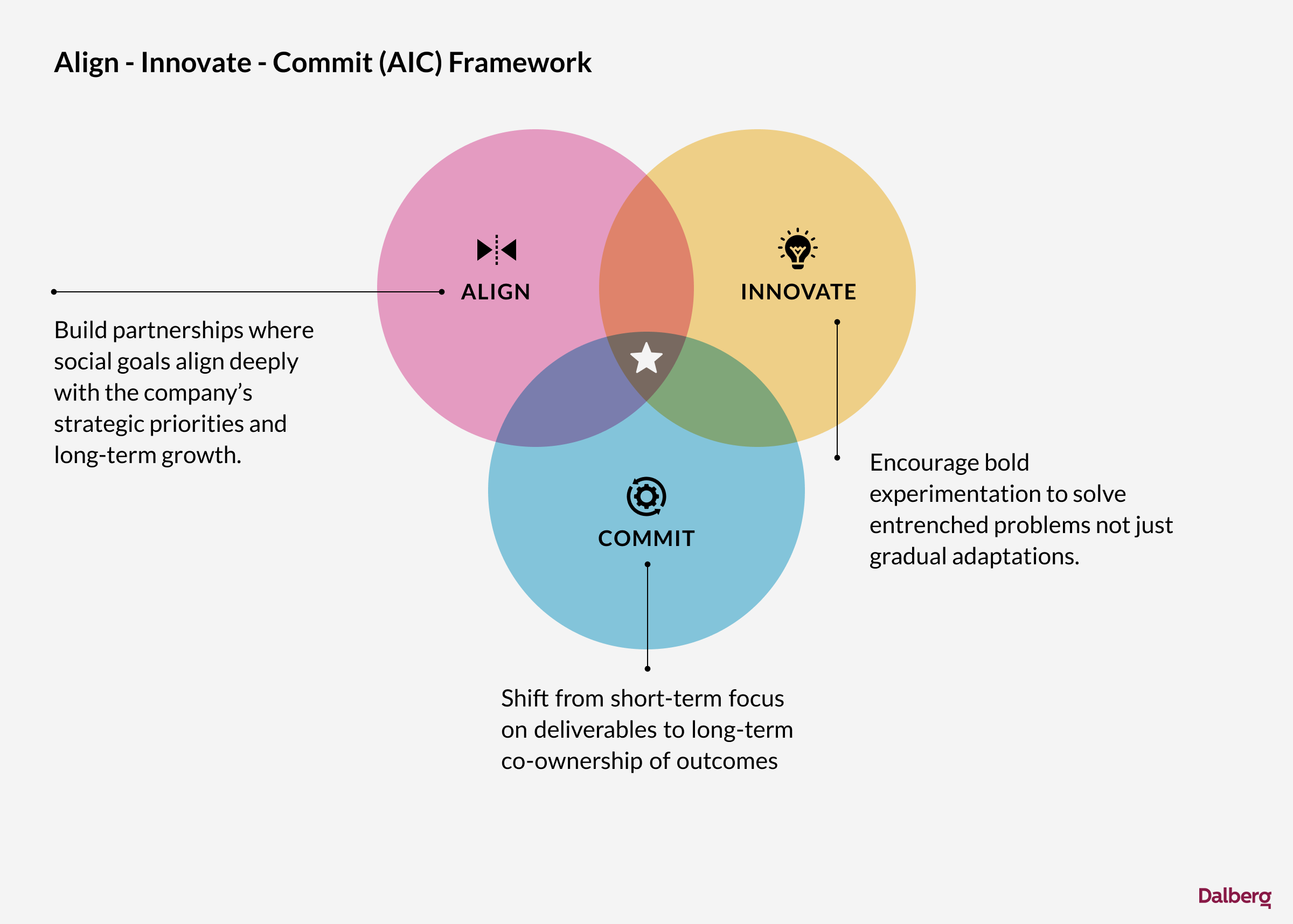
Align: Build partnerships where social goals align deeply with the company’s strategic priorities and long-term growth. This means going beyond surface-level CSR initiatives or incremental change, to address systemic issues in a scalable manner.
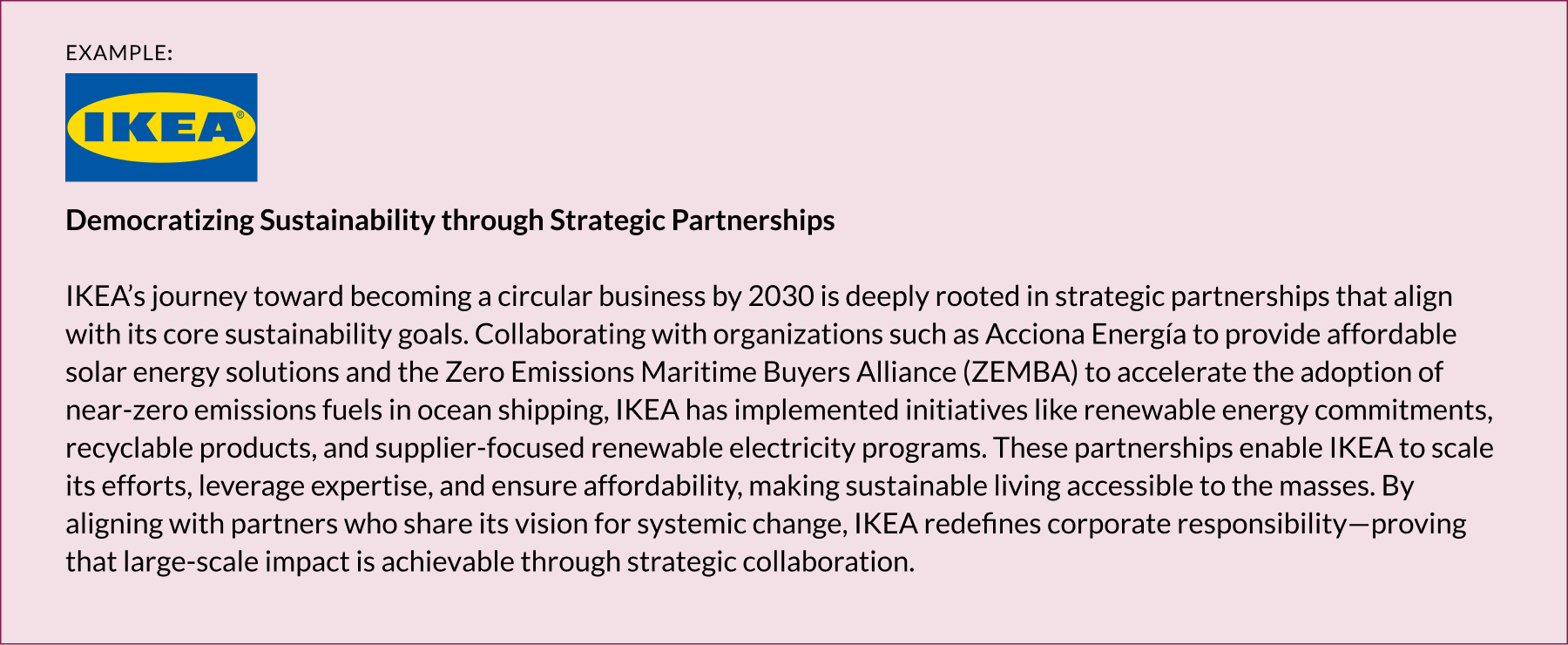
Innovate: Encourage companies to bring their best technologies, R&D, and creative thinking into the partnership, focusing on solving entrenched problems not just through gradual improvements or adaptations, but through bold experimentation and risk-taking.
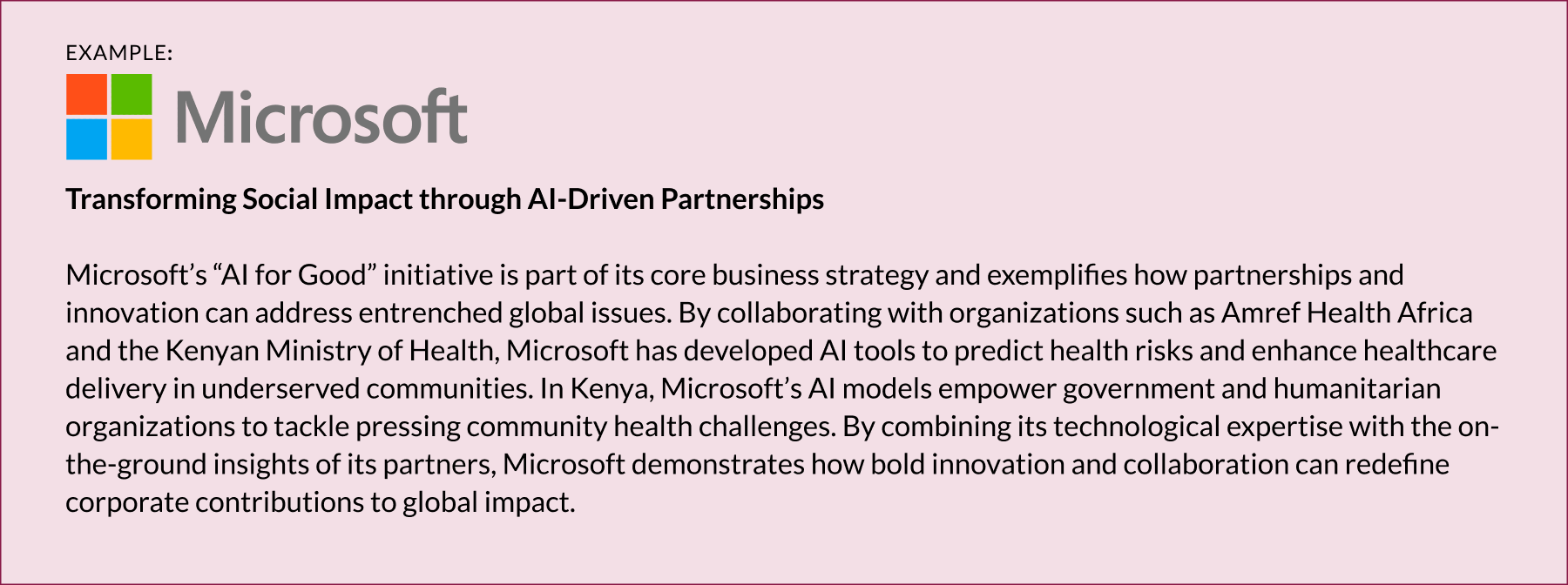
Commit: Shift from short-term partnerships that focus on deliverables and outputs to co-ownership of systemic challenges that focus on long-term outcomes.
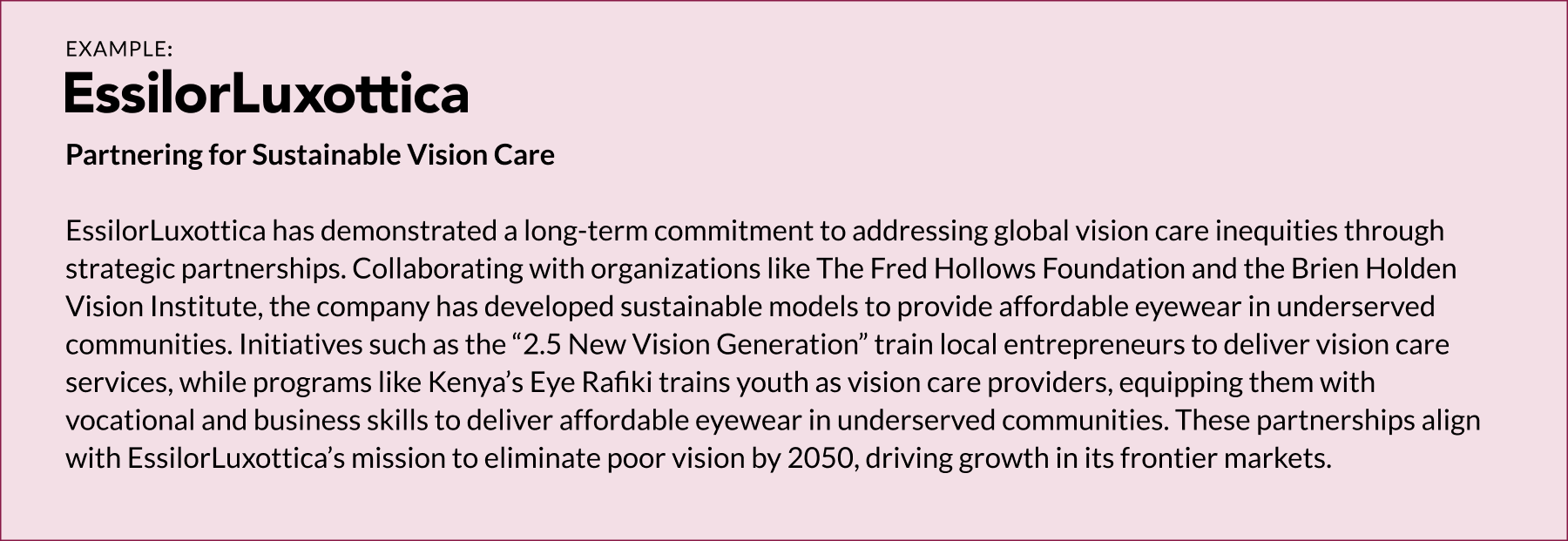
The AIC Framework in Action: Husk Power Systems Creates a Scalable Model for Rural Renewable Energy
When all the pieces of the AIC framework work together, companies can drive impactful private sector engagement at scale. Husk Power Systems, a company pioneering solar microgrids in rural India and sub-Saharan Africa is a notable example. By aligning its goals with community needs, innovating solutions tailored to local challenges, and owning the long-term outcomes, Husk Power Systems has redefined what private sector engagement in social issues can achieve. Husk has brought reliable electricity to over 100,000 people while reducing carbon emissions.
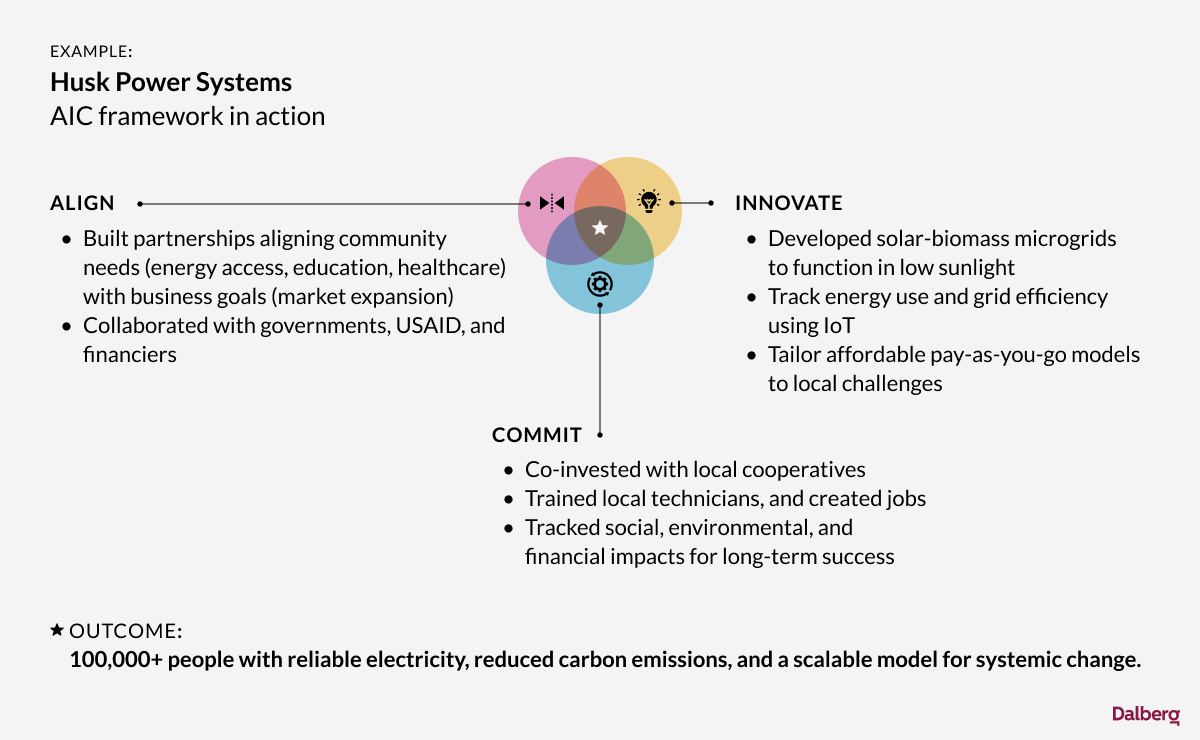
Align: Husk Power Systems aligns its mission with rural community needs and its growth objectives. In India’s underserved areas Uttar Pradesh and Bihar, where electricity access is scarce, Husk addresses key issues in economic development, education, and healthcare while tapping into a vast market. Through partnerships with local governments, development organizations like USAID, and financiers such as India Renewable Energy Development Agency (IREDA) and the Electrification Financing Initiative (ElectriFI), Husk integrates its clean energy solutions into broader rural development plans. These collaborations create a win-win: communities gain electricity, and Husk solidifies its leadership in decentralized energy.
Innovate: Husk develops cutting-edge solutions for both product and service design by leveraging strategic partnerships. Its solar-biomass hybrid microgrids, tailored to rural challenges, ensure reliable power even in low-sunlight conditions. IoT-enabled energy management systems optimize grid efficiency in real time, along with smart meters that allow it to manage mini-grids remotely and efficiently. Partners in equity investments and debt financing such as the European Investment Bank (EIB), International Finance Corporation (IFC), and FMO (Dutch Development Bank) enable pay-as-you-go models and energy subscriptions, making electricity affordable for low-income households. Without the deep expertise and shared passion for solving energy access at scale from its partners, Husk could not have achieved such a broad and diverse business. These collaborations enable Husk to deliver scalable, sustainable solutions for extremely vulnerable communities.
Commit: Husk is in this for the long term and has a significant commitment to feedback and course correction. Husk fosters shared responsibility through community-driven partnerships. It co-invests with local cooperatives, encouraging financial and operational ownership, and works with NGOs to train local technicians, creating jobs and self-reliance. To expand and improve its business, Husk collaborates with evaluation and learning partners such as the Global Off-Grid Lighting Association (GOOGLA) and Sustainable Energy for All (SEforALL) to track and measure outcomes, including electricity access, job creation, and reduced emissions. By embedding itself in communities, Husk ensures long-term systemic change through shared accountability.
The Future of Partnerships: What Needs to Change
For both CEOs and social actors, this framework points to three imperatives for reimagined engagement:
- Think Bigger: Aim for systemic change, not just incremental improvements. Instead of focusing on isolated programs or incremental improvements, strive for transformative solutions that disrupt industries, reshape markets, transform consumer behavior, and address root causes of systemic issues.
- Foster Ecosystem Thinking: Recognize the interconnectedness of industries, sectors, and communities and collaborate to create shared solutions. This approach emphasizes the importance of seeing systemic challenges as sitting across networks, where success relies on coordinated action across different stakeholders. This is not easy for corporations who would frequently rather plow ahead in isolation, but it is a game changer in terms of achieving lasting results.
- Redefine ROI: Traditional ROI measures, such as profit or shareholder value, are no longer adequate for evaluating social impact. Corporations must adopt a broader, more holistic view of returns that incorporates environmental and social benefits alongside financial outcomes. Innovative finance providers are important complements to corporates in driving results that balance business and social impact. However, most importantly, success needs to be redefined by the scale of systemic change achieved, and the ripple effects of bold initiatives that inspire others to follow suit.
A Call to Action for CEOs
The private sector has immense potential to address social challenges, but achieving large-scale impact requires innovation, long-term commitment, and strategic partnerships with a range of traditional and unconventional partners. As global forums like Davos convene, CEOs have an opportunity to ask themselves “What would it take for our company to impact a billion lives positively in the next decade?” and “How might we measure success in ways that transform our industry and communities alike?” This bold thinking will help unlock change at scale and drive progress against the world’s most entrenched problems.
Connect with Laura to know more about private sector engagement with social issues:


